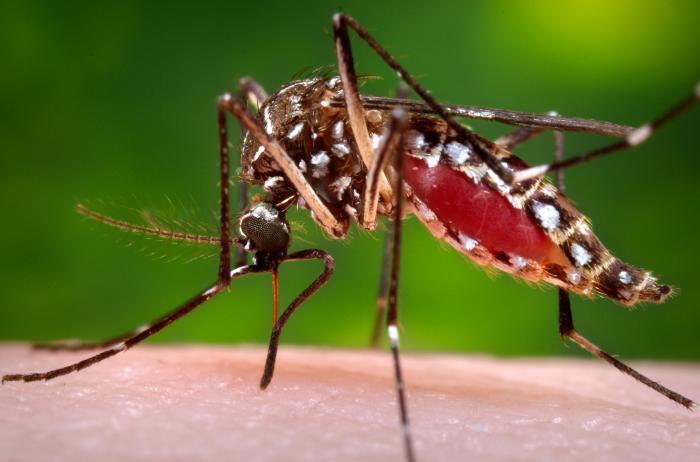
The community is urged to remain alert as the most recent data indicates a slight increase in dengue cases for this month, according to V.I. Health Commissioner Justa Encarnacion and the V.I. Health Department’s Epidemiology Division.
As of Monday, the Epidemiology Division is reporting 10 dengue cases territory-wide – eight on St. Thomas, one on St. John, and one on St. Croix, although there are more cases in the territory that are not being reported, according to the press release.
“We’re experiencing warmer and warmer temperatures as well as heavy downpours, which are ideal conditions for mosquito breeding; I am encouraging everyone to take the precautions necessary to prevent widespread transmission,” said Encarnacion. “While the increase is small, we know how easily dengue can spread and we know how dangerous it can be.”
The mosquito-borne virus spreads via the Aedes aegypti mosquito and can cause mild to severe and life-threatening symptoms. The most common symptoms of dengue are fever with aches and pains (eye pain, typically behind the eyes, muscle, joint, or bone pain), nausea, vomiting and/or rash, the press release stated.
“If you are experiencing symptoms, it is very important to go to your doctor and get tested to confirm if you truly have dengue or another illness. This is the only way we will get a correct understanding of rates of dengue in the community,” said Dr. Tai Hunte-Ceasar, chief medical officer of the V.I. Health Department.
On Tuesday, the CDC issued a Health Advisory to notify healthcare providers, public health authorities and the public of an increased risk of dengue virus infections in the United States in 2024. Global incidence of dengue in 2024 has been the highest on record for this calendar year. The neighboring island of Puerto Rico continues to see a record number of dengue cases with 1,498 reported between January and June of this year. Puerto Rico declared a State of Emergency due to dengue in April, the release stated.
The following are recommendations from the Centers for Disease Control for preventing mosquito bites:
- Use Environmental Protection Agency (EPA)-registered insect repellents with one of the following active ingredients: DEET, picaridin, IR3535, oil of lemon eucalyptus, para-menthane-diol, or 2-undecanone.
- Wear lightweight, loose-fitting long sleeves, long pants, and mosquito repellent on exposed skin.
- Always follow instructions when applying insect repellent to children.
- Do not use insect repellent on babies younger than two months old. Instead, dress your child in clothing that covers arms and legs. Cover strollers and baby carriers with mosquito netting.
- Do not use products containing oil of lemon eucalyptus (OLE) or para-menthane-diol (PMD) on children younger than three years old.
- Do not apply insect repellent onto a child’s hands, eyes, mouth, cuts, or irritated skin. Adults: spray insect repellent onto your hands and then apply to a child’s face.
To protect the home, the CDC recommends:
- Use screens on windows and doors. Repair holes in screens to keep mosquitoes outdoors.
- Once a week, empty and scrub, turn over, cover, or throw out any items that hold water like tires, buckets, planters, toys, pools, birdbaths, flowerpot saucers, or trash containers. Mosquitoes lay eggs near water.
- Tightly cover water storage containers (buckets, cisterns, rain barrels) so mosquitoes cannot get inside to lay eggs.
- For containers without lids, use wire mesh with holes smaller than an adult mosquito.
- Fill tree holes to prevent them from filling with water.
- If you have a cistern and/or septic tank, repair cracks or gaps. Cover open vents or plumbing pipes. Use wire mesh/mosquito netting with holes smaller than an adult mosquito.
According to the World Health Organization, dengue is the most common mosquito-borne virus worldwide. More than 400 million people are infected every year. The virus is endemic, occurring regularly, in more than 100 countries in tropical and subtropical climates, mostly in urban and semi-urban areas, — and in Puerto Rico, the US Virgin Islands and American Samoa, the release stated.
For more information about dengue, visit Dengue | CDC.
For weekly updates on dengue cases in the USVI, please visit the Epidemiology Division’s data dashboard.





